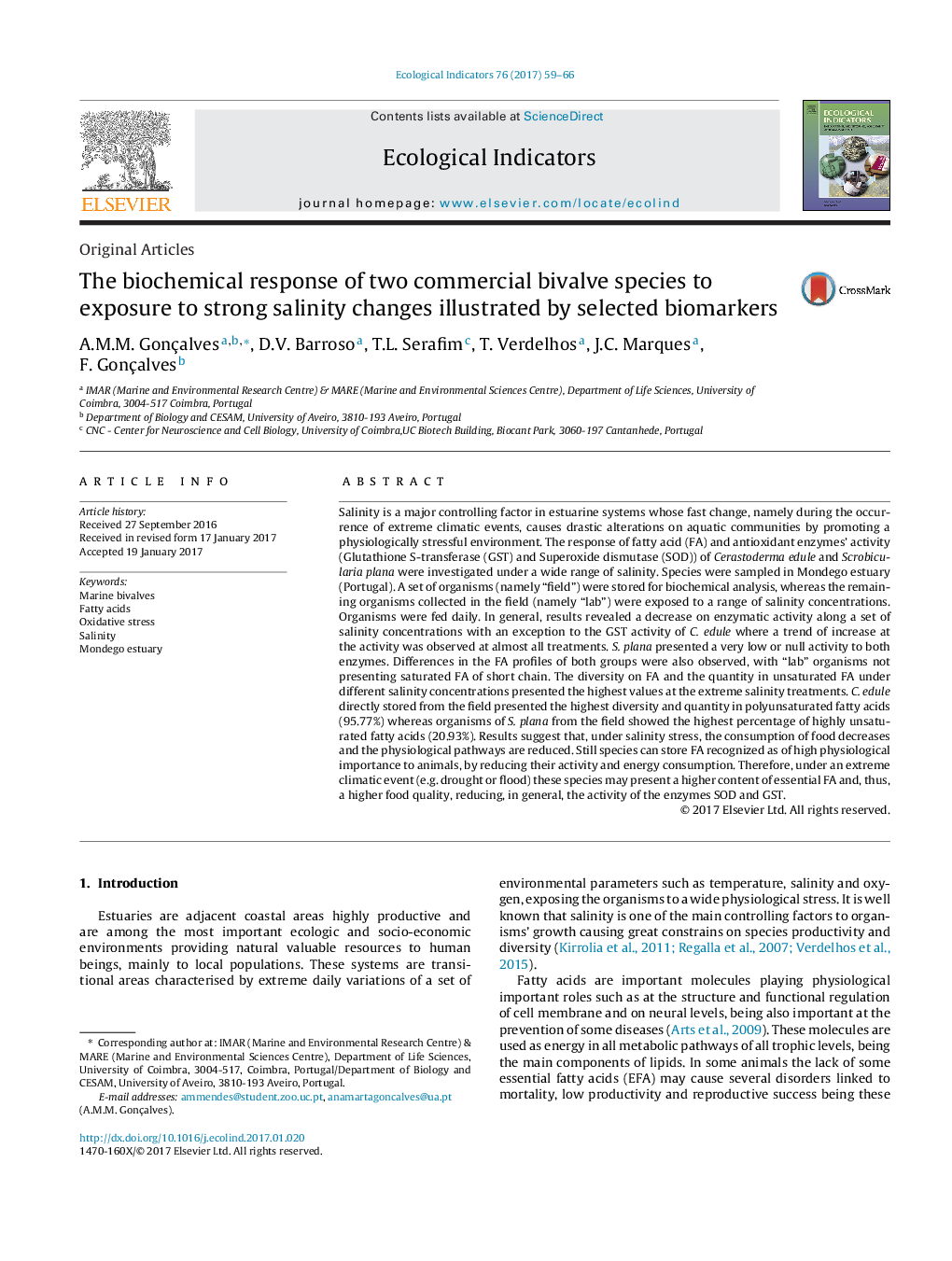| کد مقاله | کد نشریه | سال انتشار | مقاله انگلیسی | نسخه تمام متن |
|---|---|---|---|---|
| 5741710 | 1617125 | 2017 | 8 صفحه PDF | دانلود رایگان |
عنوان انگلیسی مقاله ISI
The biochemical response of two commercial bivalve species to exposure to strong salinity changes illustrated by selected biomarkers
ترجمه فارسی عنوان
پاسخ بیوشیمیایی دو گونه دوگانهای تجاری به مواجهه با تغییرات شوری قوی نشان داده شده توسط بیومارکرهای انتخاب شده است
دانلود مقاله + سفارش ترجمه
دانلود مقاله ISI انگلیسی
رایگان برای ایرانیان
کلمات کلیدی
دوغ گل دریایی، اسیدهای چرب، استرس اکسیداتیو، شوری صخره ماندگو،
موضوعات مرتبط
علوم زیستی و بیوفناوری
علوم کشاورزی و بیولوژیک
بوم شناسی، تکامل، رفتار و سامانه شناسی
چکیده انگلیسی
Salinity is a major controlling factor in estuarine systems whose fast change, namely during the occurrence of extreme climatic events, causes drastic alterations on aquatic communities by promoting a physiologically stressful environment. The response of fatty acid (FA) and antioxidant enzymes' activity (Glutathione S-transferase (GST) and Superoxide dismutase (SOD)) of Cerastoderma edule and Scrobicularia plana were investigated under a wide range of salinity. Species were sampled in Mondego estuary (Portugal). A set of organisms (namely “field”) were stored for biochemical analysis, whereas the remaining organisms collected in the field (namely “lab”) were exposed to a range of salinity concentrations. Organisms were fed daily. In general, results revealed a decrease on enzymatic activity along a set of salinity concentrations with an exception to the GST activity of C. edule where a trend of increase at the activity was observed at almost all treatments. S. plana presented a very low or null activity to both enzymes. Differences in the FA profiles of both groups were also observed, with “lab” organisms not presenting saturated FA of short chain. The diversity on FA and the quantity in unsaturated FA under different salinity concentrations presented the highest values at the extreme salinity treatments. C. edule directly stored from the field presented the highest diversity and quantity in polyunsaturated fatty acids (95.77%) whereas organisms of S. plana from the field showed the highest percentage of highly unsaturated fatty acids (20.93%). Results suggest that, under salinity stress, the consumption of food decreases and the physiological pathways are reduced. Still species can store FA recognized as of high physiological importance to animals, by reducing their activity and energy consumption. Therefore, under an extreme climatic event (e.g. drought or flood) these species may present a higher content of essential FA and, thus, a higher food quality, reducing, in general, the activity of the enzymes SOD and GST.
ناشر
Database: Elsevier - ScienceDirect (ساینس دایرکت)
Journal: Ecological Indicators - Volume 77, June 2017, Pages 59-66
Journal: Ecological Indicators - Volume 77, June 2017, Pages 59-66
نویسندگان
A.M.M. Gonçalves, D.V. Barroso, T.L. Serafim, T. Verdelhos, J.C. Marques, F. Gonçalves,
